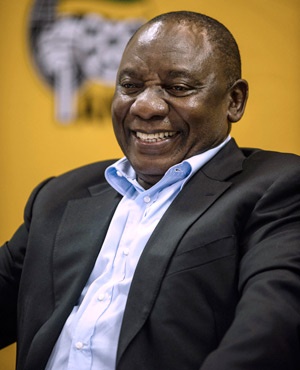Cyril Ramaphosa, the new leader of South Africa’s governing ANC party, says he will stamp out corruption and pursue a policy of “radical economic transformation” to speed up expropriation of land without compensation.
Ramaphosa, a 65-year-old union leader who became a businessman, is likely to become the country’s next president after elections in 2019, because of his party’s electoral dominance.
He has promised to fight rampant corruption and revitalise the economy, a message hailed by foreign investors.
“This Conference has resolved that corruption must be fought with the same intensity and purpose that we fight poverty, unemployment and inequality,” he said in his maiden speech at the close of a five-day party meeting at which he was elected.
“We must also act fearlessly against alleged corruption and abuse of office within our ranks,” Ramaphosa said in the early hours of Thursday after a long delay.
Ramaphosa, who is South Africa’s deputy president, was elected the new leader of the African National Congress (ANC) on Monday, succeeding President Jacob Zuma as party head after Zuma’s presidency became tainted with corruption allegations.
Ramaphosa’s narrow victory over former cabinet minister and African Union Commission chairwoman Nkosazana Dlamini-Zuma, 68, is seen as a pivotal moment for the ANC, which launched black-majority rule under Nelson Mandela’s leadership 23 years ago.
Ramaphosa paid tribute to Zuma in his speech, saying the ANC would be “united” despite a fractious campaign.
Zuma had backed his ex-wife Dlamini-Zuma for ANC’s top job.
However, investors are concerned that Ramaphosa may not be able to push through policy changes.
This is because the ANC’s top decision-making group, known as the “Top Six”, was split down the middle, with three politicians apiece drawn from Ramaphosa’s camp and that of his rival Dlamini-Zuma.
Zuma has faced allegations of corruption since he became head of state in 2009 but has denied any wrongdoing.
The president has also faced allegations that his friends, the wealthy Gupta businessmen, wielded undue influence over his government.
Zuma and the Guptas have denied the accusations.
Ramaphosa alluded to these allegations in his speech, saying “at the state level we must confront the reality that critical institutions of our state have been targeted by individuals and families, through the exercise of influence and the manipulation of governance processes and public resources.”
He said this had weakened the state-owned enterprises in Africa’s most industrialised economy.
The continent’s traditional powerhouse has seen lethargic growth over the last six years and the jobless rate stands near record levels.
Ramaphosa also had a warning for corporate executives.
“We must investigate without fear or favour the so-called ‘accounting irregularities’ that cause turmoil in the markets and wipe billions off the investments of ordinary South Africans,” he said.
South African furniture retailer Steinhoff, has been embroiled in a scandal over accounting irregularities, which have wiped more than $10 billion off its market value over the past two weeks.
Ramaphosa also said he would expedite job creation, improve the lackluster economy and speed up the transfer of land to black people.
Two decades after the end of apartheid, the ANC is under pressure to redress racial disparities in land ownership where whites own most of the land.
“This Conference has resolved that the expropriation of land without compensation should be among the mechanisms available to government to give effect to land reform and redistribution,” he said.
He added that the land transfers would be expedited under the radical economic transformation program, a vague ANC plan to tackle racial inequality. (NAN)

